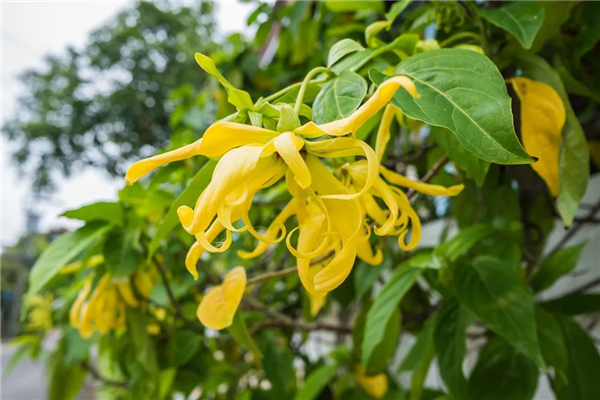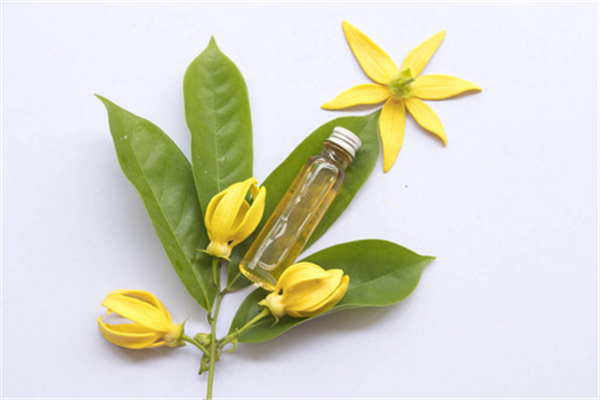Ylang ylang is mainly used to steam oil from fresh petals, which is called ylang oil. The oil yield of fresh flowers is 2-3%, with a unique and rich aroma. It is a precious raw material for the spice industry and is widely used in perfumes, soaps and cosmetics. The "ylang ylang" spice extracted from it is the most precious natural high-grade spice and high-grade fixative in the world today, so people call it "the world's fragrant flower champion" and "the natural perfume tree".
At present, cosmetics and detergents made from ylang ylang are emerging in the market in an endless stream, and they are very popular and in short supply. The high-grade spice of Chanel No. 5, the most expensive perfume in the world.
The "ylang ylang" spice extracted from ylang ylang flowers is the most precious natural high-grade spice and high-grade fixative in the world today. The rich fragrance of ylang ylang has the reputation of "the crown of the world's fragrant flowers".
Ylang essential oil is an extract from the plant ylang ylang flower. The substance is colorless or yellow, liquid, clear, fragrant and heavy.
The ylang-ylang tree is a small tree with oval leaves and narrow petals. The flowers are yellow, pink, and purple-blue. The essential oil is obtained by distilling the flowers. The best is the light yellow essential oil extracted from yellow flowers. The main production areas are Malaysia, the Philippines, Myanmar, and Australia in Southeast Asia.

This small tropical tree has pink, blue-purple, and bright yellow flowers depending on the species, but the essential oil extracted from the yellow flowers is better. The essential oil obtained from the first distillation of these flowers is of the best quality. The essential oils obtained later have similar therapeutic effects, but the fragrance is inferior. These inferior oils are usually called Cananga. This semi-wild tree species has hard and brittle wood and is commonly found on the following islands such as Seychelles, Mauritius, Tasi and the Philippines. The ylang-ylang essential oil produced in Madagascar is the best ylang-ylang essential oil. Ylang-ylang essential oil is a very clear light yellow liquid.
The ylang-ylang essential oil sold on the market is divided into five grades according to the segmentation of the essential oil extracted during the distillation process. Only the special grade, high grade, and first grade are suitable for aromatherapy. Extra ylang ylang is the first essential oil to be extracted after the distillation begins. It has the best quality and the strongest smell. Most of the esters are in extra ylang ylang. The essential oil that comes out later, the final distillate, is usually called Cananga. But whether it is ylang ylang or Cananga, the therapeutic effect is the same. It's just that Cananga has a rougher smell.
Ylang essential oil is extracted in sections during the distillation process and is divided into five grades. The main ones suitable for aromatherapy are extra, high and first grade. Extra ylang ylang is extracted in the initial distillation stage, with excellent quality and strong smell. Extra ylang ylang contains a lot of esters.
The essential oil extracted later is called high ylang ylang, and its quality is lower than that of extra ylang ylang. The essential oil after that is the first grade ylang ylang, at which time the active ingredients contained in the essential oil have been diluted. All three grades of ylang essential oil are suitable for aromatherapy.
It is worth noting that the essential oil extracted in the later stage of the distillation process, the final distillate called Cananga, has the same therapeutic effect as the previous grades of ylang essential oil. The main difference between Conagar and Ylang Ylang is the smell. Conagar is rougher and its smell is not as delicate as Ylang Ylang.
Therefore, when choosing Ylang Ylang essential oil, you can give priority to special, advanced and first-grade Ylang Ylang. These grades of essential oils are of high quality and suitable for aromatherapy. As a "by-product" of essential oil, Conagar's therapeutic effect is not inferior, but its smell characteristics may be more suitable for use in specific occasions. In general, the classification of Ylang Ylang essential oil grades helps consumers choose the right essential oil according to their needs and achieve better results.
Ylang Ylang essential oil is also called "perfume tree". It is called "perfume tree" because many perfume brands use Ylang Ylang essential oil as the base tone of perfume, and the aroma of Ylang Ylang essential oil is very mysterious and exotic, making people feel as if they are in a particularly charming, sentimental and charming foreign land. People in foreign lands tend to be "unbridled", so the spirit that Ylang Ylang essential oil tries to convey in perfume is to encourage people to enjoy life a little more unbridled.
Ylang Ylang is usually grown in tropical areas. The essential oil is extracted from the yellow flowers of the ylang ylang tree. The flowers are large and have a strong aroma. The essential oil is usually extracted by steam distillation or water distillation. The oil gland cells in the petals of ylang ylang flowers are special and are particularly sensitive to gravity (i.e. gravity). Therefore, when extracting, the amount of extraction cannot be too large at one time. It cannot be as large as the amount that can be extracted at one time by essential oils such as lavender, peppermint, and eucalyptus. This is one of the reasons why ylang ylang essential oil is expensive. Of course, the "expensive" we are talking about here is not the expensive level of rose essential oil and jasmine essential oil.
There is no doubt that the quality of Ylang Ylang Extra is "special" and the most expensive. Then by analogy, there are grades one, two, and three. The price of Complete is usually between grade one and grade two; some essential oil merchants will also put it between Extra and grade one, calling it "high-grade".

Extra, sometimes subdivided into "Superior Ylang Ylang Essential Oil", is the essential oil distilled within the first 15 minutes to half an hour of extracting Ylang Ylang essential oil, and the distiller must be controlled within a gravity value greater than 0.965. In other words, after putting the ylang ylang flowers into the distiller, the essential oil extracted within half an hour at most has the best quality and the most beautiful aroma, and of course the highest price.
After half an hour, the distiller continues to distill, and the essential oil obtained in the next hour is "Extra Ylang Ylang Essential Oil". The price of extra ylang ylang essential oil is also expensive, and the gravity of the distiller must be controlled between 0.955 and 0.965, and this value needs to be very precise.
Next is the first-grade ylang ylang essential oil, marked "Ylang Ylang|" followed by a Roman numeral. The distiller continues the above extraction process. From the next 1.5 hours to 3 hours, the first-grade ylang-ylang essential oil is obtained. At this time, the gravity of the distiller is between 0.945 and 0.955.
From the next 3.5 hours to the 6th hour, the essential oil obtained is the second-grade ylang-ylang essential oil, and the gravity of the distiller is between 0.932 and 0.940.
From the 6th hour to the 8th hour, sometimes even up to the 16th to 22nd hour, this is the final stage of extraction. The essential oil obtained at this stage is the third-grade ylang-ylang essential oil. Of course, its quality and price are relatively the lowest. This grade of ylang-ylang essential oil will be used in daily chemical products such as shampoo, shower gel, and hand cream. The "Complete advanced ylang-ylang essential oil" is made of Extra special plus grade one, plus grade two. We call it "complete ylang-ylang essential oil" or "advanced ylang-ylang essential oil".
Extra ylang-ylang essential oils are mostly used in very expensive perfume making or by professional aromatherapists.
Black Pepper Oil Extraction
Molecular Distillation Equipment Application
Oleoresins Introduction
Contact: Project Manager
Phone: +86-18120438367
Tel: +86-18120438367
Email: info@tycoretech.com
Add: No. 1, Optics Valley Avenue, East Lake New Technology Development Zone, Wuhan, Hubei, China
We chat
